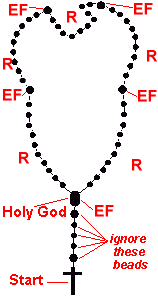|
I.
When
Making The Sign of the Cross
In the name of the Father, and of the Son, and of the Holy
Ghost. Amen. (said while touching forehead, breast, left shoulder, then
right shoulder)
Latin Version: Signum Crucis
In nomine Patris et Filii et Spiritus Sancti. Amen.
II.
The Our
Father
Our Father, Who art in Heaven, Hallowed be Thy Name. Thy
Kingdom come, Thy Will be done, On earth as it is in Heaven. Give us
this day, our daily bread, And forgive us our trespasses, as we forgive
those who trespass against us. And lead us not into temptation, but
deliver us from evil. Amen.
Latin Version: Pater Noster (Oratio
Dominica)
Pater noster, qui es in caelis, sanctificetur Nomen tuum. Adveniat
regnum tuum. Fiat voluntas tua, sicut in caelo et in terra. Panem
nostrum quotidianum da nobis hodie, et dimitte nobis debita nostra
sicut et nos dimittimus debitoribus nostris. Et ne nos inducas in
tentationem, sed libera nos a malo.
III.
Hail Mary
Hail Mary, Full of Grace, The Lord is with thee. Blessed art
thou amongst women, and blessed is the fruit of thy womb, Jesus. Holy
Mary, Mother of God, pray for us sinners now, and at the hour of death.
Amen.
Latin Version: Ave Maria (or Salutatio Angelica)
Ave Maria, gratia plena, Dominus tecum. Benedicta tu in mulieribus, et
benedictus fructus ventris tui, Iesus. Sancta Maria, Mater Dei, ora pro
nobis peccatoribus, nunc, et in hora mortis nostrae. Amen.
IV.
The
Apostles' Creed
I believe in God, the Father almighty, Creator of heaven and
earth, and in in Jesus Christ, His only Son, our Lord. He was conceived
by the Holy Ghost, and born of the Virgin Mary. He suffered under
Pontius Pilate, was crucified, died and was buried. He descended into
Hell. On the third day He rose again. He ascended into Heaven, and is
seated at the right hand of God the Father Almighty. He will come again
to judge the living and the dead. I believe in the Holy Ghost, the Holy
Catholic Church, the communion of saints, the forgiveness of sins, the
resurrection of the body, and life everlasting. Amen.
Latin Version: Symbolum Apostolorum
Credo in Deum Patrem omnipotentem, Creatorem caeli et terrae. Et in
Iesum Christum, Filium eius unicum, Dominum nostrum, qui conceptus est
de Spiritu Sancto, natus ex Maria Virgine, passus sub Pontio Pilato,
crucifixus, mortuus, et sepultus, descendit ad inferos, tertia die
resurrexit a mortuis, ascendit ad caelos, sedet ad dexteram Dei Patris
omnipotentis, inde venturus est iudicare vivos et mortuos. Credo in
Spiritum Sanctum, sanctam Ecclesiam Catholicam, sanctorum communionem,
remissionem peccatorum, carnis resurrectionem, vitam aeternam. Amen.
V.
Eternal
Father
Eternal Father, I offer Thee the Body and Blood, Soul and
Divinity of Thy dearly beloved Son, Our Lord Jesus Christ, in atonement
for our sins and for the sins of the whole world.
Latin Version: Pater aeterne
Pater aeterne, offero tibi Corpus et Sanguinem, animam et divinitatem
dilectissimi Filii Tui, Domini nostri, Iesu Christi, in propitiatione
pro peccatis nostris et totius mundi.
VI.
Response
For the sake of His sorrowful Passion, have mercy on us and
on the whole world.
Latin Version:
Pro dolorosa Eius passione, miserere nobis et totius mundi.
VII.
Holy God
Holy God, Holy Mighty One, Holy Immortal One, have mercy upon
us and on the whole world.
Latin version: Sanctus Deus
Sanctus Deus, Sanctus Fortis, Sanctus Immortalis, miserere nobis et
totius mundi.
VIII.
Optional
Concluding Prayer (The "Three O'Clock Prayer")
O Blood and Water, which hast gushed forth from the Heart of
Jesus as a Fount of Mercy for us, we trust in Thee.
O Blood and Water, which hast gushed forth from the Heart of Jesus as a
Fount of Mercy for us, we trust in Thee.
O Blood and Water, which hast gushed forth from the Heart of Jesus as a
Fount of Mercy for us, we trust in Thee.
Footnotes:
1 The prayers in their original Polish:
Eternal
Father:
Ojcze Przedwieczny, ofiaruje Ci Cialo i Krew,
Dusze i Bˇstwo najmilszego Syna Twojego,
a Pana naszego Jezusa Chrystusa,
na przeblaganie za grzechy nasze i calego swiata.
Response:
Dla Jego bolesnej Meki miej milosierdzie dla nas i calego swiata.
Holy God:
Swiety Boze, Swiety Mocny, Swiety Niesmiertelny, zmiluj sie
nad nami i
nad calym swiatem.
|


